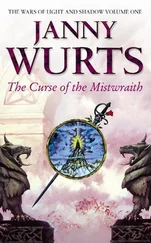Lewis Wingfield - The Curse of Koshiu - A Chronicle of Old Japan
Здесь есть возможность читать онлайн «Lewis Wingfield - The Curse of Koshiu - A Chronicle of Old Japan» — ознакомительный отрывок электронной книги совершенно бесплатно, а после прочтения отрывка купить полную версию. В некоторых случаях можно слушать аудио, скачать через торрент в формате fb2 и присутствует краткое содержание. Жанр: foreign_prose, на английском языке. Описание произведения, (предисловие) а так же отзывы посетителей доступны на портале библиотеки ЛибКат.
- Название:The Curse of Koshiu: A Chronicle of Old Japan
- Автор:
- Жанр:
- Год:неизвестен
- ISBN:нет данных
- Рейтинг книги:3 / 5. Голосов: 1
-
Избранное:Добавить в избранное
- Отзывы:
-
Ваша оценка:
- 60
- 1
- 2
- 3
- 4
- 5
The Curse of Koshiu: A Chronicle of Old Japan: краткое содержание, описание и аннотация
Предлагаем к чтению аннотацию, описание, краткое содержание или предисловие (зависит от того, что написал сам автор книги «The Curse of Koshiu: A Chronicle of Old Japan»). Если вы не нашли необходимую информацию о книге — напишите в комментариях, мы постараемся отыскать её.
The Curse of Koshiu: A Chronicle of Old Japan — читать онлайн ознакомительный отрывок
Ниже представлен текст книги, разбитый по страницам. Система сохранения места последней прочитанной страницы, позволяет с удобством читать онлайн бесплатно книгу «The Curse of Koshiu: A Chronicle of Old Japan», без необходимости каждый раз заново искать на чём Вы остановились. Поставьте закладку, и сможете в любой момент перейти на страницу, на которой закончили чтение.
Интервал:
Закладка:
Hidden away, centre of an intricate labyrinth-enclosed in many courts, each hung with myriad lamps in bronze-like fringes round the eaves-stands the Holy of Holies, Buddha's hunting-box, wherein a band of virgins perform weird shinto rites for the behoof of awe-struck pilgrims. At stated seasons this bevy of priestesses, emerging from strict retirement, performs the kagura , a slow swanlike measure, with many and intricate figures and waving of fans and bells and kerchiefs, accompanied by priestly flutes-which (doubtless good for the soul, since its weary length is interminable) is soothing also to ear and eye, for the ladies are graceful and slender in their loose red trousers and gossamer robes, their long locks flowing as they float to and fro, with a background of gold screens, and beyond the antique forest. How peaceful a life, free from sordid cares, must these holy damsels lead! Far from the fretful striving of the churlish world-its hate and jealousy and bitterness and disillusion-no call to arms or shock of war invades this calm retreat. They share ungrudgingly their Eden with the beasts and butterflies, guileless and content as they, strumming the three-stringed samisen, sailing through maze of solemn kagura , doing tender service in the temple.
Among the troop of maidens was one who wore no religious habit. Although she had taken no vows, priests and virgins loved her as much as if one of themselves. Brought up among them with the hares and birds for comrades, as stately and as gentle as the deer, she shared from childhood, being motherless, their pure and contemplative life. Strangers often said that the fairest thing in lovely Nara was the tall and pale O'Tei. Some compared her to the unblown white lotos as it sways dreamily in the breeze. Others dubbed her pearl; but later all agreed that young Sanjo the armourer was delivered of the neatest simile when he fashioned a white fawn of purest silver and gave it to the maiden for a hairpin. As a child she had always been still and given to day-dreams, peering into the flowers as if she could read secrets there, or gazing into the opal sky in search of angels, or watching the pallid stars as they glimmered forth out of the deepening blue. Yet was she as gay as the chirping cicadas in the trees, as light and fleet as her four-footed friends, as, pattering on dainty clogs in wayward mood, she would leave the forest for the town, and peeping in at Sanjo's, shake an arch finger at the brawny armourers, while they wiped their swart brows, and laughed.
It was by a whimsical coincidence that the celebrated family of Sanjo, from time immemorial armourers in chief to the Mikados, as the Miochins were to the Shoguns, should have set up the forge, emblem of war, hard by the sacred wood, the type of peace. But so it was. Indeed, as I write, the existing Sanjos occupy the ancestral dwelling. They are poor now. Their occupation is gone, for civilisation and European ways have stepped in and ruined them. At the period which occupies us, the blowing of the forge-bellows and the welding of iron on the anvil were in curious contrast to the surrounding calm. Many lords who came hither in pilgrim guise to improve their soul's estate, looked in at Sanjo's ere they went away, to buy new blades and armour. The holy forest was an oasis of peace in a world of uproar; for was not the castle of the powerful lord of Nara but a mile beyond the town; and did not close by (happily concealed by a hill from his proud gaze) the fortress of the Daimio of Osaka rear its majestic front, home of his hereditary foe? Of course it was enough for two great feudal lords to dwell cheek by jowl for them to hate one another cordially. These two were as jealous as two rival beauties. The outer moat at Nara was wider than that of my lord of Osaka, but then the interior of Osaka's stronghold was the more splendid, and its armoury more richly furnished. Hence frowns and jibes and backbitings from generation to generation, varied now and then by siege or battle, accompanied by fire and massacre.
Among the many who were firm friends of the Sanjos, was, naturally enough, Sampei. Of course, so gallant a young gentleman could wear no armour but Sanjo's, could wield no sword but one that bore his mark. One morning, standing beside the anvil, and laying down the law to an obsequious audience, on military subjects, he beheld, framed in the doorway, such a delightful vision, that his heart gave a great thump, and he dropped the precious blade, whose temper he was critically testing by the bisecting of a coin. It was only for a second. Startled by the apparition of a distinguished stranger, and grown unaccountably bashful of a sudden, the blushing and beautiful O'Tei cried Oh! and, turning on her clogs, scampered back into the wood, whither the inflammable Sampei would swiftly have followed, had he not been restrained by the armourer.
"Beware!" the latter whispered, grasping him tightly by the skirt. "That maid is not for thee! The heiress of the Daimio of Nara will look higher than a soldier of fortune!"
Sampei laughed, to conceal his annoyance. It is exasperating and humiliating too, to a handsome young soldier, who as such adores the sex, to be bluntly informed that the loveliest girl whom he has ever looked upon is hopelessly out of reach. And yet he could not deny that his friend was right. The White Fawn of Nara might never be his, for one so noble and so fair could command the most splendid of partis . But was that any reason why he should not look at her? He was heartwhole. No doubt of that. His soul was devoted to his sword; but, as dashing young warriors have done time out of mind, he liked to dally with maidens, and the prettier they were the better. Instead of purchasing a blade and departing straightway, he all at once became fastidious. This one was too light; that one ill-balanced.
Japan is the land of blades. From the tail of the Dragon was born the sword which the Sun-goddess bestowed on the first Emperor. By the sword of the clustering clouds, Yamato-Daké subdued the East. It was quite fitting that our young general should be particular. Sanjo produced in vain his rarest achievements. There was "Knee-cutter" and "Beard-divider," unrivalled masterpieces, which Sanjo himself so loved that he had always declined to part with them. But there was no satisfying this capricious and arrogant youth. Sanjo would be good enough to set himself to work and create an inspiration; and Sampei, to whom time had all at once become no object, would remain at Nara and superintend the progress of the miracle. And so it came about that the blade, taking long to make, O'Tei (curious, after the fashion of maidens) came pattering along the street, just to see if the young warrior was gone. Oddly enough, he was still there; with face towards the door too. This was well, if strange; for he was comely; extremely civil, to boot; courteous, and vastly respectful; could troll rich snatches of merry song, and tell diverting tales with dancing eye and glittering teeth; while as for his smile, it did one good to bask under it-so bright it was, so warm and genial, exuberant with bubbling youth.
The brawny workers at the anvil vowed with grins and nudges that 'twas charming to watch these two-she, the type of the patrician beauty of her country-complexion of palest olive, nose aquiline, cheek bones a trifle high, perfectly moulded chin and throat, eyes and hair a deep black, the former raised the least little bit in the world at the outer corners-as she lounged in a steely kimono of finest crape drawn up over one of scarlet. And he was in his way as bonny a spectacle. Exceeding dark of skin; of low stature, as are most of the Japanese, but admirably proportioned and muscular; his luxuriant sable locks (shaven away in the centre, lest the eyes should be obscured in battle), fastened in two tresses at the back, while a becoming blue fillet bound his temples, knotted at the side in a bow.
Читать дальшеИнтервал:
Закладка:
Похожие книги на «The Curse of Koshiu: A Chronicle of Old Japan»
Представляем Вашему вниманию похожие книги на «The Curse of Koshiu: A Chronicle of Old Japan» списком для выбора. Мы отобрали схожую по названию и смыслу литературу в надежде предоставить читателям больше вариантов отыскать новые, интересные, ещё непрочитанные произведения.
Обсуждение, отзывы о книге «The Curse of Koshiu: A Chronicle of Old Japan» и просто собственные мнения читателей. Оставьте ваши комментарии, напишите, что Вы думаете о произведении, его смысле или главных героях. Укажите что конкретно понравилось, а что нет, и почему Вы так считаете.












